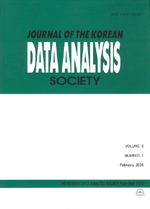기질과 모와의 기질 조화적합성이 유아의 언어발달에 미치는 영향
The Impact of Infant Temperament and the Goodness-of-Fit on the Expressive and Receptive Language Development
- 한국자료분석학회
- Journal of The Korean Data Analysis Society (JKDAS)
- Vol.17 No.1
-
2015.02365 - 379 (15 pages)
- 118

본 연구는 3세에서 5세 유아의 표현언어 및 수용언어의 발달에 미치는 기질과 어머니와의 기질의 조화적합성의 효과를 탐구하고자 하였다. 201명의 유아와 어머니를 대상으로 유아의 기질 및 조화적합성, 그리고 수용언어 및 표현언어발달 수준간의 관계를 분석하였다. 그 결과, 표현 언어와 수용언어 모두에서 유아의 언어발달에 영향을 미치는 기질 변인은 기질의 네 가지 차원 중 주의력 차원뿐인 것으로 나타났으며, 어머니와의 기질 조화적합성은 유연성과 활동성에서 유의미한 결과가 나타났다. 또한 조화적합성은 표현언어의 발달에 있어서는 큰 역할을 하지 않는 반면, 수용언어 발달에 있어서는 유의미한 설명력을 보였다. 본 연구의 결과는 유아의 언어발달과 기질간의 관계에 있어 기질의 조화적합성 및 수용/표현 언어발달을 고려할 필요가 있다는 점을 시사한다.
While many studies have been conducted to investigate the relationships between infants’ temperament and their psychological development, relatively few studies have focused on the role of temperament, and the goodness-of-fit in the language development. The present study examined the relations among temperament, goodness-of-fit between temperament and mother’s expectation in predicting 3- to 5-year-old children’s expressive and receptive language development. Results from 201 children and their mothers’ data indicated that temperamental attention span was a significant predictor for children’s language development. The goodness-of-fit had minimal effect on the expressive language development, but it has significant impact on the development of receptive language. The results of the present study implied that children’s age and expressive/receptive language distinction may be moderating in the relationship between temperament and language development.
1. 서론
2. 이론적 배경
3. 방법
4. 결과
References
(0)
(0)